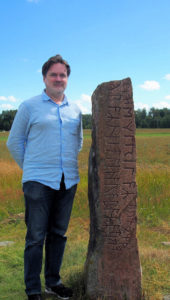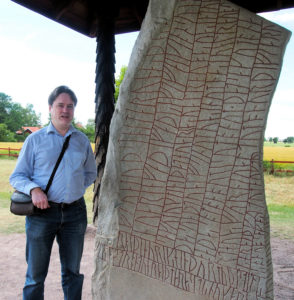The oldest runestones in Sweden are written in a language that was called Old Scandinavian (or Proto Norse). In that time the language was understtod throughout Scandinavia.

I visited one of the runestones in Järsberg, Sweden, in the summer. And I encountered a verbform that is still easily read today: ᚹᚫᚱᛁᛏᚢ writu (write). So despite the almost 1500 years there is still something very common with the language.
More:
- Järsberg at runes.verbix.com: …ᚢᛒᚫᛉ ᚺᛁᛏᛖ ÷ ᚺ=ᚫᚱᚫᛒᚫᚾᚫ=ᛉ ᚺ=ᚫᛁᛏ… ᛖᚲ ᛖ=ᚱᛁᛚᚫᛉ ᚱᚢᚾᛟᛉ ᚹᚫᚱᛁᛏᚢ
- Conjugate Old Scandinavian verbs
- About the Old Scandinavian AKA Proto Norse in wiki.verbix.com


 But around AD 400 the Germanic tribes were on the move allover Europe, as can be seen in the map behind the link below.
But around AD 400 the Germanic tribes were on the move allover Europe, as can be seen in the map behind the link below. Celtic languages are those ancients with long history. They are nowadays spoken principally in Wales and on the countryside in Western Ireland.
Celtic languages are those ancients with long history. They are nowadays spoken principally in Wales and on the countryside in Western Ireland. Baltic languages belong to the Indo-European languages. Today Baltic languages are spoken in Latvia (Latvian language) and Lithuania (Lithuanian language). But in the XIV Century, Baltic languages were spoken on a much bigger area. Follow the link below to see where.
Baltic languages belong to the Indo-European languages. Today Baltic languages are spoken in Latvia (Latvian language) and Lithuania (Lithuanian language). But in the XIV Century, Baltic languages were spoken on a much bigger area. Follow the link below to see where. A book teaching Finnish for school children tells on page 11: “It is important to know the infinitive, if you need to look up the word in a dictionary. You can get help in this at
A book teaching Finnish for school children tells on page 11: “It is important to know the infinitive, if you need to look up the word in a dictionary. You can get help in this at 